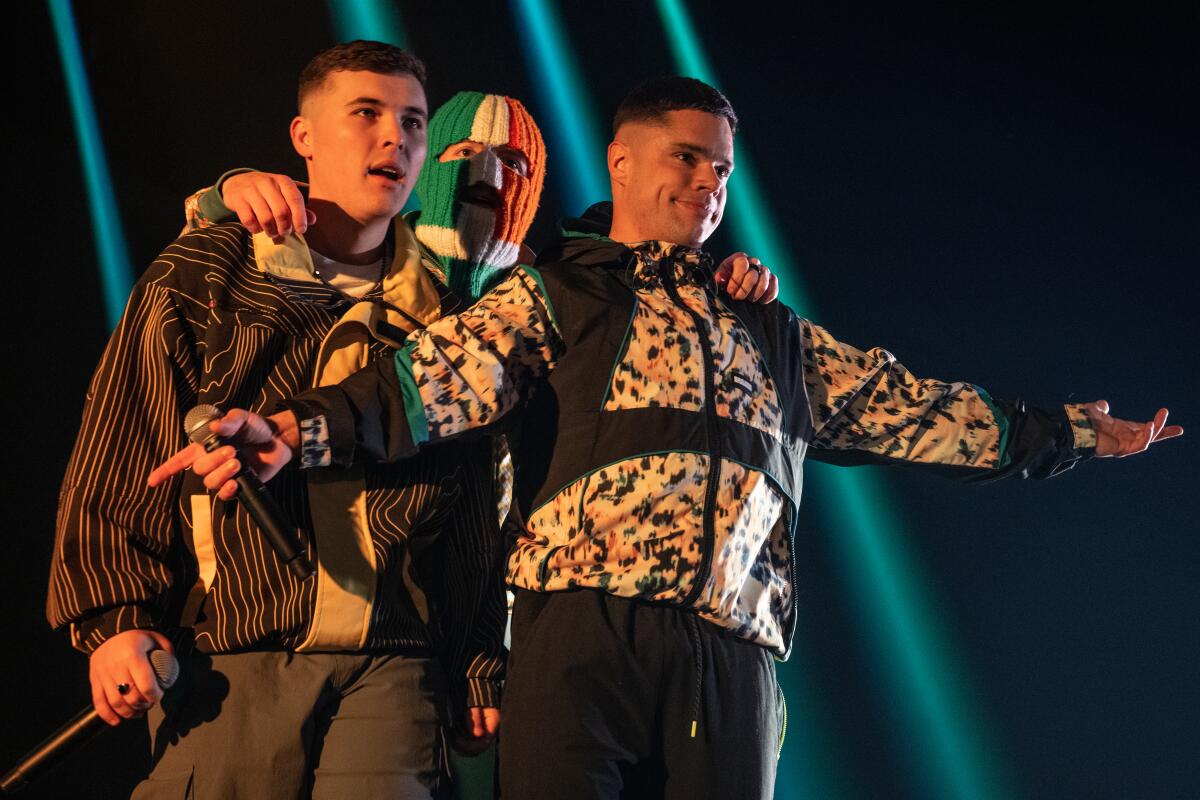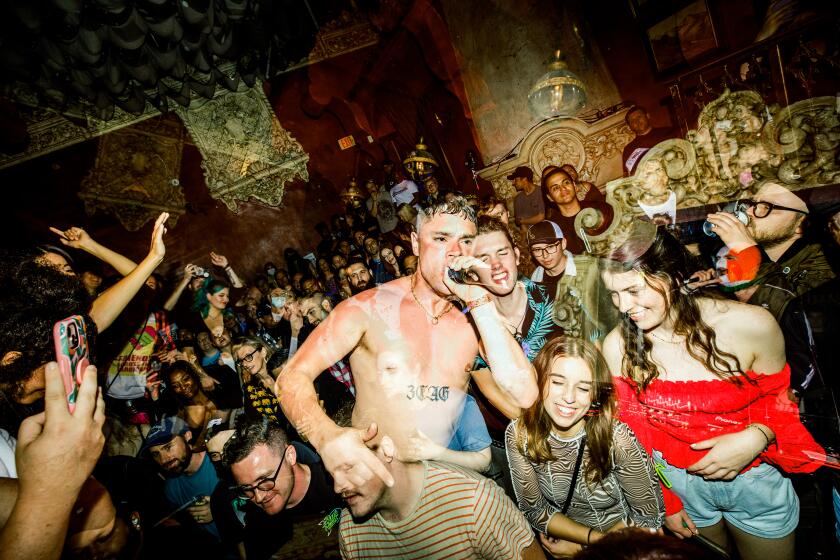Coachella may be ‘notorious,’ but Kneecap just needs ‘12 Irish’ to get the crowd going

- Share via
It’s 12 p.m. in Bali, and two-thirds of Kneecap are sitting on a couch for a Zoom interview. DJ Próvai is in Ireland, spending time in Derry, while Móglaí Bap and Mo Chara are soaking in the Indonesian sun, eagerly preparing for their “date with a f— swimming pool.”
“How many people go to Coachella?” Chara asks.
Bap throws out a number — “150,000.”
“It’d be less than that… 100,000,” Chara chimes back.
They’re not far off, if you are looking at a single day’s attendance. The self-proclaimed “sun cream brigade” have made the pilgrimage across the Atlantic to perform at music’s sacred grounds in Indio on Friday at 6:10 p.m.
The festival is a victory lap for the group after a momentous year that included a critically-acclaimed album, a BAFTA-winning quasi-biopic and performances across the globe. They may not feel exactly at home under the sweltering desert sun (Ireland gets rain 150 to 225 days a year, depending on the location), but they still greet the occasion with open arms.
“It’s just an iconic festival, even though it’s renowned across the world for being s—,” Chara says with a laugh. “Everyone’s just blown away that we’re even in the conversation.”
After all, they’re the latest in a small but riveting group of Irish acts to appear at the Coachella Valley Music and Arts Festival. Prior to their inclusion, the stage has been graced by talent such as Dermot Kennedy, Annie Mac, and Hozier.
“Obviously, the L.A. crowds are notorious for not moving too much,” Bap jokes. “But the good thing about the Irish, as they say, we’re everywhere.”
“Give us a crowd of 1,000 Americans,” Chara adds. “As long as there’s about 12 Irish in it, we’ll be able to get the rest of them going.”
The group, who are well known for their revitalization and use of Irish, don’t think the crowd will struggle with the language barrier, either. According to Bap, “we just have a lot of good, fun energy” and “keep people engaged.”
For them, Irish is not merely a language but a symbol of republicanism (no, not that kind), which can be credited to the language’s history of ebbing and flowing between extinction and existence.

Its decline can be traced back to a couple of key events, including an omission from Irish schools from 1831 to 1878 and the Great Famine of 1845 — which ripped through poorer, rural areas, where the language was still prominent, resulting in a rapid decline of speakers.
“Kneecap represents this urban identity of the language that never really existed in Ireland,” Bap explains. “The Irish language has existed for a long time in Ireland, but it mainly only exists in rural areas like Galway.”
Even in a world after 1916’s Easter Rising — when Irish nationalists revolted against British rule— governmental efforts to revive Irish proved futile. As Irish journalist and author Fintan O’Toole notes, by the mid-20th century, “the self-mocking joke was that most Irish people were illiterate in two languages.”

The Irish government wants “to save and preserve the language, but in their own image of it,” Bap, who learned the language at home, says. “They want it to be pure and innocent, so that it’s digestible … when it’s always been a language of the people and it’s filthy.”
“I think there’s like f— 20 words for vagina … because we’d f— all else to do except sit about and talk, have sex,” he adds.
The biggest boost the language received was in 2003, when the Official Languages Act required various institutions to make services available in Irish. Northern Ireland wouldn’t see similar legislation until 2022.
Even so, “they don’t use it in Belfast,” Chara notes.
“I don’t think they have had a genuine effort in trying to revive the language. … I think deep down, they don’t believe it has any value for them,” Bap explains. “If you look at the school system down south, people learn Irish for 14 years and then leave school and can’t really speak it.”
And the statistics support this. According to the Irish Times, a 2022 census found that of the 1.9 million who could speak the language, only 71,000 used it daily. It’s why a modern implementation of the Irish revival is so crucial, and why Kneecap is dedicated to saving it from being lost to time.

“Language, if it’s going to survive, has to be a part of everyday life,” Bap says. “And everyday life these days consists of TikToks and readings and Instagram.”
He also says that the group’s more authentic approach to using the language is a key factor. Though they’re not the first to try and do music in Irish, their everyday use of it makes its inclusion in songs sound “effortless.”
But not all have been accepting of their efforts: An application for a grant in 2023 turned into a high-profile court case after Conservative Party leader Kemi Badenoch blocked distribution of funds over alleged anti-British sentiment.
“Well, they were right about that,” Chara jests.
The Belfast group won the case in late 2024, and were paid $18,268 on the grounds of “unlawful and procedurally unfair” exclusion. They went on to donate the funds to two Belfast organizations, Glór na Móna and R-City Belfast.
“I think that was a big statement, because especially in the north, politicians … paint a picture that Protestants and Catholics never get along. … They believe that we can’t get past that,” Bap says.
He recalled meeting a young Protestant rapper who went by Young Spencer who had grown up in the working-class area of Shankill, where R-City is located. He went on to perform at a later gig alongside Kneecap, and they had “no problem getting along.”
“We can get along quite well, even though maybe he would prefer to be in the United Kingdom and we would prefer to have united Ireland,” Bap says.
“It’s only in Ireland that these things seem like the biggest f— things in the world,” he continues. “And I understand politics is very divisive, but it doesn’t mean that we all shouldn’t be able to f— get along, at least in the meantime.”
More to Read
The biggest entertainment stories
Get our big stories about Hollywood, film, television, music, arts, culture and more right in your inbox as soon as they publish.
You may occasionally receive promotional content from the Los Angeles Times.











